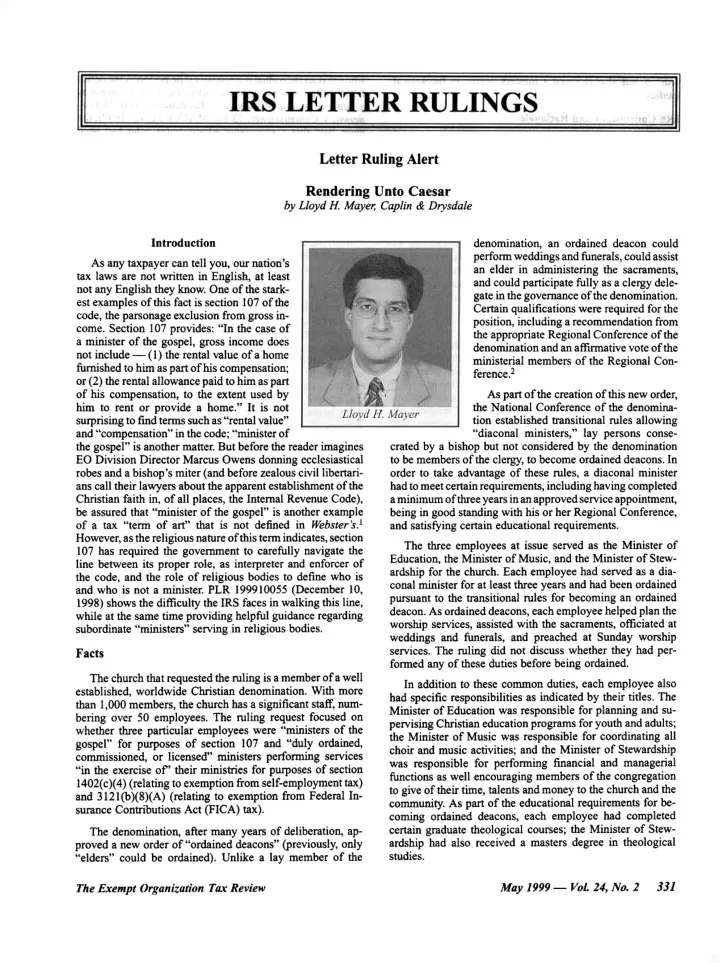

Letter Ruling Alert Rendering Unto Caesar by Lloyd II Mayel; Caplin & Drysdale Introduction denomination, an ordained deacon could perfonn weddings and funerals, could assist As any taxpayer can tell you, our nation's an elder in administering the sacraments, tax laws are not written in English, at least and could participate fully as a clergy dele- not any English they know. One of the stark- gate in the governance of the denomination. est examples of this fact is section 107 of the Certain qualifications were required for the code, the parsonage exclusion from gross in- position, including a recommendation from come. Section 107 provides: "In the case of the appropriate Regional Conference of the a minister of the gospel, gross income does denomination and an affinnative vote of the not include- (1) the rental value of a home ministerial members of the Regional Con- furnished to him as part ofhis compensation; ference! or (2) the rental allowance paid to him as part of his compensation, to the extent used by As part of the creation of this new order, him to rent or provide a home." It is not the National Conference of the denomina- surprising to fmd terms such as "rental value" tion established transitional rules allowing and "compensation" in the code; "minister of "diaconal ministers," lay persons conse- the gospel" is another matter. But before the reader imagines crated by a bishop but not considered by the denomination EO Division Director Marcus Owens donning ecclesiastical to be members of the clergy, to become ordained deacons. In robes and a bishop's miter (and before zealous civillibertari- order to take advantage of these rules, a diaconal minister ans call their lawyers about the apparent establishment of the had to meet certain requirements, including having completed Christian faith in, of all places, the Internal Revenue Code ), a minimum of three years in an approved service appointment, be assured that "minister of the gospel" is another example being in good standing with his or her Regional Conference, of a tax "term of art" that is not defined in Webster's.I and satisfying certain educational requirements. However, as the religious nature of this term indicates, section The three employees at issue served as the Minister of 107 has required the government to carefully navigate the Education, the Minister of Music, and the Minister of Stew- line between its proper role, as interpreter and enforcer of ardship for the church. Each employee had served as a dia- the code, and the role of religious bodies to define who is conal minister for at least three years and had been ordained and who is not a minister. PLR 199910055 (December 10, pursuant to the transitional rules for becoming an ordained 1998) shows the difficulty the IRS faces in walking this line, deacon. As ordained deacons, each employee helped plan the while at the same time providing helpful guidance regarding worship services, assisted with the sacraments, officiated at subordinate "ministers" serving in religious bodies. weddings and funerals, and preached at Sunday worship services. The ruling did not discuss whether they had per- Facts fonned any of these duties before being ordained. The church that requested the ruling is a member of a well In addition to these common duties, each employee also established, worldwide Christian denomination. With more had specific responsibilities as indicated by their titles. The than 1,000 members, the church has a significant staff, num- Minister of Education was responsible for planning and su- bering over 50 employees. The ruling request focused on pervising Christian education programs for youth and adults; whether three particular employees were "ministers of the the Minister of Music was responsible for coordinating all gospel" for purposes of section 107 and "duly ordained, choir and music activities; and the Minister of Stewardship commissioned, or licensed" ministers performing services was responsible for perfonning financial and managerial "in the exercise of' their ministries for purposes of section functions as well encouraging members of the congregation 1402(c)(4) (relating to exemption from self-employmenttax) to give of their time, talents and money to the church and the and 3121(b)(8)(A) (relating to exemption from Federal In- community. As part of the educational requirements for be- surance Contributions Act (FICA) tax). coming ordained deacons, each employee had completed certain graduate theological courses; the Minister of Stew- The denomination, after many years of deliberation, ap- ardship had also received a masters degree in theological proved a new order of "ordained deacons" (previously, only "elders" could be ordained). Unlike a lay member of the studies. 331 The Exempt Organization Tax Review May 1999- Vol. 24, No.2
Recommend
More recommend